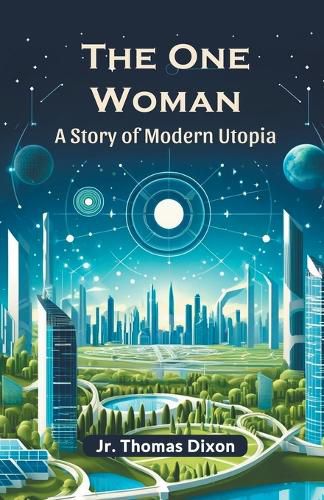Readings Newsletter
Become a Readings Member to make your shopping experience even easier.
Sign in or sign up for free!
You’re not far away from qualifying for FREE standard shipping within Australia
You’ve qualified for FREE standard shipping within Australia
The cart is loading…






This title is printed to order. This book may have been self-published. If so, we cannot guarantee the quality of the content. In the main most books will have gone through the editing process however some may not. We therefore suggest that you be aware of this before ordering this book. If in doubt check either the author or publisher’s details as we are unable to accept any returns unless they are faulty. Please contact us if you have any questions.
"The One Woman: A Story of Modern Utopia" by Thomas Dixon Jr., published in 1903, presents a narrative that blends elements of utopian ideals, social critique, romance, and conflict. Set within a fictional utopian society, the novel explores Dixon's vision of an idealized future where societal flaws are addressed through innovative governance and communal living. Central to the plot is a romantic storyline that unfolds amidst the backdrop of this utopian setting. The protagonist navigates personal and interpersonal conflicts within the framework of a society striving for perfection. Dixon uses the romantic plotline not only to entertain but also to explore deeper themes of human relationships and emotional fulfillment within the context of an idealistic community. "The One Woman" also serves as a platform for Dixon's critique of contemporary society. Through the lens of his utopian vision, he critiques the shortcomings of existing social structures, advocating for reforms that prioritize communal welfare and social justice. Themes of social reform permeate the novel, reflecting Dixon's belief in the potential for societal improvement through visionary leadership and collective action. However, amidst the utopian aspirations, Dixon does not shy away from portraying conflicts that arise both within the community and in the protagonist's personal life. These conflicts serve to underscore the challenges inherent in striving for perfection and the complexities of human nature, even within the most idealistic of settings. In summary, "The One Woman: A Story of Modern Utopia" by Thomas Dixon Jr. is a thought-provoking exploration of utopian ideals, social critique, romance, and conflict. Through its narrative, Dixon invites readers to contemplate the possibilities and limitations of utopian visions while engaging with timeless themes of love, societal change, and the human condition.
$9.00 standard shipping within Australia
FREE standard shipping within Australia for orders over $100.00
Express & International shipping calculated at checkout
This title is printed to order. This book may have been self-published. If so, we cannot guarantee the quality of the content. In the main most books will have gone through the editing process however some may not. We therefore suggest that you be aware of this before ordering this book. If in doubt check either the author or publisher’s details as we are unable to accept any returns unless they are faulty. Please contact us if you have any questions.
"The One Woman: A Story of Modern Utopia" by Thomas Dixon Jr., published in 1903, presents a narrative that blends elements of utopian ideals, social critique, romance, and conflict. Set within a fictional utopian society, the novel explores Dixon's vision of an idealized future where societal flaws are addressed through innovative governance and communal living. Central to the plot is a romantic storyline that unfolds amidst the backdrop of this utopian setting. The protagonist navigates personal and interpersonal conflicts within the framework of a society striving for perfection. Dixon uses the romantic plotline not only to entertain but also to explore deeper themes of human relationships and emotional fulfillment within the context of an idealistic community. "The One Woman" also serves as a platform for Dixon's critique of contemporary society. Through the lens of his utopian vision, he critiques the shortcomings of existing social structures, advocating for reforms that prioritize communal welfare and social justice. Themes of social reform permeate the novel, reflecting Dixon's belief in the potential for societal improvement through visionary leadership and collective action. However, amidst the utopian aspirations, Dixon does not shy away from portraying conflicts that arise both within the community and in the protagonist's personal life. These conflicts serve to underscore the challenges inherent in striving for perfection and the complexities of human nature, even within the most idealistic of settings. In summary, "The One Woman: A Story of Modern Utopia" by Thomas Dixon Jr. is a thought-provoking exploration of utopian ideals, social critique, romance, and conflict. Through its narrative, Dixon invites readers to contemplate the possibilities and limitations of utopian visions while engaging with timeless themes of love, societal change, and the human condition.